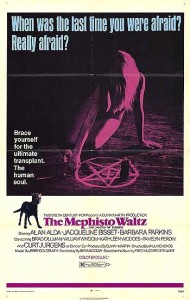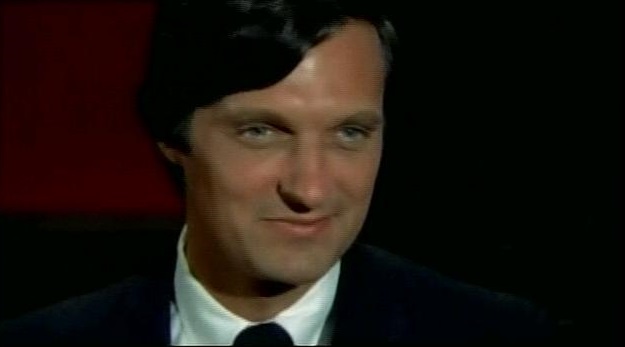“I happen to be the greatest pianist alive, and I’ll tell you this, Mr. Myles Clarkson: hands like yours are one in a hundred thousand.”
|

Synopsis:
Dying concert pianist Duncan Ely (Curt Jurgens) and his daughter (Barbara Parkins) use satanic powers to transfer Ely’s soul into the body of music journalist Myles Clarkson (Alan Alda). Clarkson’s wife (Jacqueline Bisset) becomes disturbed by her husband’s change of character, and when their daughter Abby (Pamelyn Ferdin) dies suddenly, she begins to suspect witchcraft.
|
|
Genres, Themes, Actors, and Directors:
- Curt Jurgens Films
- Demonic Possession
- Horror
- Jacqueline Bisset Films
- Musicians
- Pact With the Devil
- Satanists
Review:
Based on a novel by Fred Mustard Stewart, this demonic thriller is regarded by many as simply a second-rate imitation of Rosemary’s Baby (1968); indeed, many elements of the story — as well as director Paul Wendkos’ choice of cinematic devices — echo its famous precursor. On its own terms, Mephisto Waltz remains a visually sumptuous yet not entirely satisfying tale of demonic possession. I enjoyed seeing Alan Alda with an evil glint in his eye, and Curt Jurgens (who makes a brief appearance in the beginning of the film) is perfectly cast as the egotistical pianist intent on maintaining his talent beyond death. Less noteworthy are the performances by the female leads: while Bisset does a decent job as Alda’s jealous wife, we never really care for her, and Parkins is similarly icy and reserved. The best aspect of the film remains the titular musical piece; Franz Liszt’s meaty, dissonant composition may be the best evocation ever of a pact with the devil.
Redeeming Qualities and Moments:
- Curt Jurgens as Duncan Ely

- Alan Alda as Myles Clarkson

- A haunting, appropriately satanic score
- The convoluted, yet satisfying, twist ending
Must See?
No. This one is only must-see viewing for fans of films on witchcraft.
Links:
|



One thought on “Mephisto Waltz, The (1971)”
Not a must. Agreed that the best aspect of the film is the use of Liszt’s music; in fact, the music soundtrack overall may be the creepiest thing at work here.
It’s too bad Curt Jurgens leaves the film when he does; he’s the only one whose acting is worth watching. It’s interesting to watch Bisset making love to Alda just after Jurgens’ spirit has entered him; it’s one of the few times she comes up to the plate and she’s clearly imagining what it must be like to actually be in the arms of a brawny, brooding genius like Jurgens. Too bad she’s actually in the arms of Alda – who I would like to say is simply miscast but the guy can’t really act, at least not here.
And it’s true; we never care about Bisset and Parkins seems a tad too one-note, esp. for one in league with the devil (though both are photographed effectively). BTW: we care much less for the child Ferdin – hers is an annoying performance, plain and simple.
I do like one bit in particular: Bisset is in the throes of figuring out whether Alda’s ability as a pianist has improved or if Jurgens is playing through him. She realizes she couldn’t have been listening to a taped recording because, as she tells Alda, “The tape machine is cold!” We all know how beastly hot tape recorders get.
The film’s last ten minutes or so should please those who’ve stuck it out. It’s one of those ‘Wait-a-minute…if-she-just…then…how?…who?’ twists.